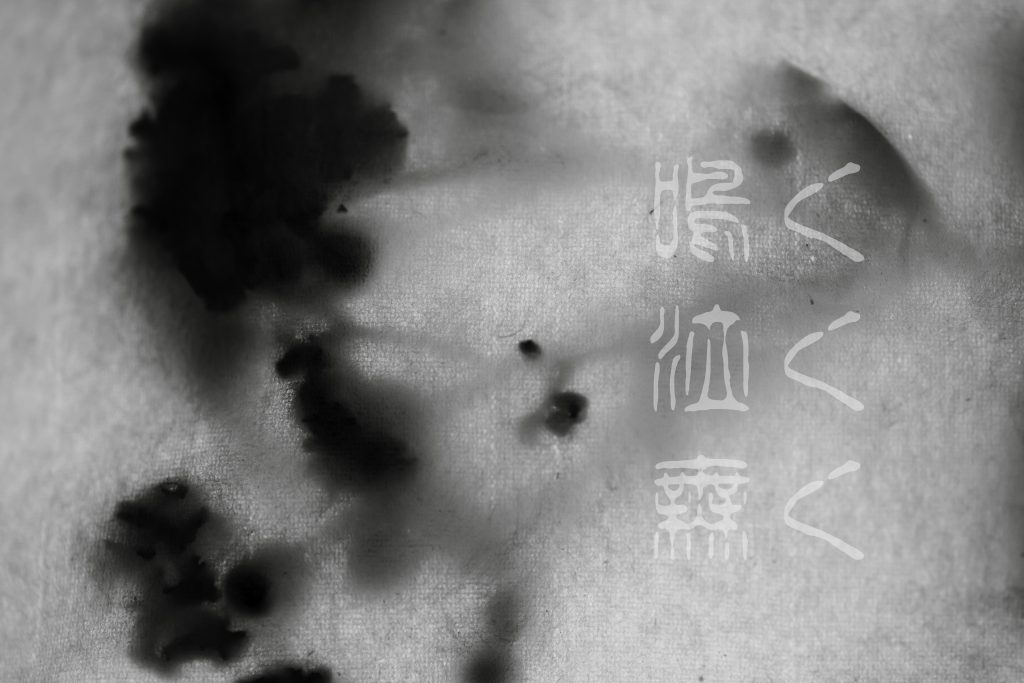
これを見よ
人もとがめぬ恋すてふ
音をなく虫の
なれる姿を
重光大納言
しげみつのだいなごん
emprunté au Gosenshū 後撰和歌集, livre « Amour », n° 794
minamoto no shigemitsu / mitsuakira 源重光 (env. 920-993), qui portait le titre de dainagon (titre élevé juste en-dessous de ministre)
これをみよ
ひともとがめぬ こいすてふ
ねをなくむしの
なれるすがたを
regarde donc
mon amour que nul ne pourrait critiquer
est devenu cette mue de cigale muette
contexte :
le poète envoie à une femme la mue d’une cigale et joint ce poème
son amour ignoré l’a laissé enveloppe vide sans voix
l’amour pur qui consume
Analyse mot à mot
これを見よ : « Regarde donc cela ! » – apostrophe directe, très visuelle.
人も咎めぬ : « que les gens ne critiquent pas » ; toga-menu = « ne pas blâmer ».
恋すてふ : forme classique de koisu to iu, « dire que l’on aime » → « un amour que l’on nomme » ou simplement « un amour ».
音をなく虫 : littéralement « l’insecte qui a perdu sa voix », c’est-à-dire la cigale après la mue ; le mot « 虫 » désigne ici la cigale (semi).
なれる姿 : « la forme (la carcasse) dans laquelle il est devenu ».
なく joue sur trois homophones : 鳴く (chanter), 泣く (pleurer), 無く (perdre). « ねをなくむし » condense à la fois l’insecte qui chante, l’homme qui pleure, et la perte de voix. le poème semble célèbre pour cette homophonie (kakekotoba)
English translation
Borrowed from the Gosenshū 後撰和歌集, “Love” section, no. 794
Minamoto no Shigemitsu / Mitsuakira 源重光 (c. 920–993), who held the title of Dainagon (a high court rank just below minister).
これをみよ
ひともとがめぬ こいすてふ
ねをなくむしの
なれるすがたを
Look at this—
my love, which no one could reproach,
has become
the husk of a cicada
that has lost its voice.
Context:
The poet sends a cicada’s empty shell to a woman, with this poem attached.
His love, ignored, has left him a hollow shell without a voice.
A pure love that consumes.
Word-by-word analysis:
- これを見よ : “Behold this!” – direct, visual apostrophe.
- 人も咎めぬ : “that people do not blame”; toga-menu = “not to reproach.”
- 恋すてふ : classical form of koisu to iu, “to say that one loves” → “a love so called,” or simply “love.”
- 音をなく虫 : literally “the insect that has lost its voice,” i.e. the cicada after its molt.
- なれる姿 : “the form it has become,” i.e. the empty shell.
The key pun is on なく, which folds together 鳴く (to sing), 泣く (to weep), and 無く (to lose). Thus ne o naku mushimeans at once “the insect that sings,” “the person who weeps,” and “the one who has lost his voice.”
日本語訳
後撰和歌集「恋」第794番より
源重光(みなもとのしげみつ/みつあきら、920頃–993)、大納言の位(大臣のすぐ下の高位)を持つ。
これをみよ
ひともとがめぬ こいすてふ
ねをなくむしの
なれるすがたを
これをご覧ください
誰からも咎められぬ恋が
このように
声を失った蝉の殻
となってしまった姿を
背景:
詩人は蝉の抜け殻を女に贈り、この歌を添えた。
無視された恋は彼を声なき殻にしてしまった。
清らかな恋が、ついには身を喰らい尽くす。
語釈:
– これを見よ:「これをご覧あれ」直接的な呼びかけ。
– 人も咎めぬ:「人も非難しない」=正当な恋。
– 恋すてふ:「恋すと言ふ」=「恋すると言われること」。
– 音をなく虫:「声を失った虫」=蝉の抜け殻。
– なれる姿:「そうなってしまった姿」。
なく には「鳴く」「泣く」「無く」の三義が掛けられている。蝉が鳴く、人が泣く、そして声を失う。その三重の意味がこの一句に凝縮されている。
请看此物
人不指责的所谓恋情,
如今已化为那失声之虫——
蝉蜕的空壳。
Qǐng kàn cǐ wù
Rén bù zhǐ zé de suǒ wèi liàn qíng,
Rú jīn yǐ huà wéi nà shī shēng zhī chóng——
Chán tuì de kōng ké.
重光大纳言
(しげみつのだいなごん / Shigemitsu no Dainagon)
出自《后撰和歌集》「恋」卷,第794首
源重光(约920–993年),官位为大纳言(即仅次于大臣的高位官职)
原文如下:
これをみよ
ひともとがめぬ こいすてふ
ねをなくむしの
なれるすがたを
法语释义:
请看——
这份无人指责的爱,
如今成了这只失去声音的虫,
只留下蜕下的形体。
背景说明:
诗人将一只蝉的蜕壳送给一位女子,并附上这首和歌。
他那无人回应的爱,
使他只剩下一具无声的空壳——
一种纯粹而焚心的爱。
逐词解析:
- これを見よ:「请看此物!」——直接而具视觉冲击的呼语。
- 人も咎めぬ:意为“他人也不加以指责”;toga-menu 表“无可非议”。
- 恋すてふ:古语形式,意为“所谓的恋爱”,或简作“恋情”。
- 音をなく虫:字面为“失去声音的虫”,实指蜕皮后的蝉。此处“虫”特指“蝉”(semi)。
- なれる姿:所成之形,即“成为(那样)的模样”,也可译作“所遗之壳”。
- “なく”三义并举:鳴く(鸣叫)、泣く(哭泣)、無く(消失),此为著名的“掛詞”(双关)手法,将虫之哀鸣、人之悲泣、爱之逝去三意合于一句。

Vous devez être connecté pour poster un commentaire.